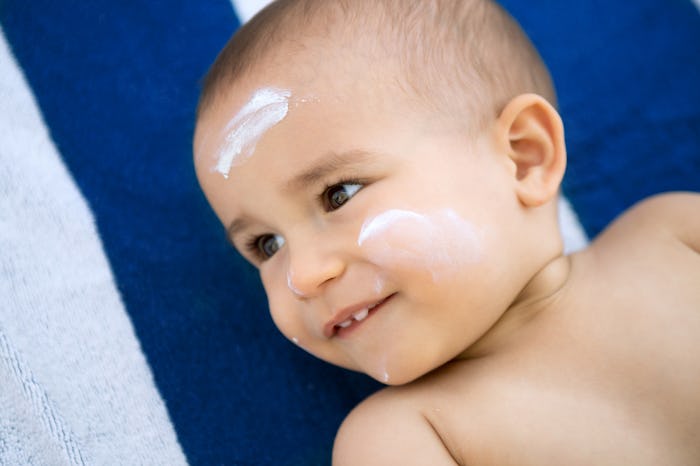Life

Yes, You *Do* Need To Reapply Sunscreen To Your Baby, & Here's How Often
For a while there, we thought warmer days may not be coming, but spring is finally here. And with that lovely, warm sunshine comes a whole other world of parenting — how to protect your baby's sweet, sensitive skin from the sun. Like most other baby-related things, it can get pretty confusing. When do you start putting sunscreen on babies? How long does it last? And is that better than protective clothing? Everyone has their own way of doing things, but here's how often to put sunscreen on baby, according to the people who know.
"For children over 6 months, when outside, avoid peak sun hours, and ensure your child is well protected with a hat or sunglasses and sunblock," pediatrician Dr. Alison Mitzner tells Romper. She recommends buying a product that is ‘broad spectrum’ and protects against both UVA and UVB rays. "It should be SPF 15 or higher," Mitzner notes. It is important to apply the product 15 minutes before going outside, as it needs to absorb to start working. "Put in on thick all over (should see white on the skin) and reapply every two hours and also after your child sweats, goes in the pool ,or gets wet," she says.
And avoiding sun exposure altogether between the hours of 10 a.m. and 3 p.m. is best. That's when the sun is strongest and can do the most damage.
But what about babies under 6 months of age? Well, according to the Food and Drug Administration (FDA), the best thing to do is just keep them out of the sun. "Infants younger than 6 months should stay out of the sun as much as possible," says Mitzner, "If outside, ensure they are kept in the shade and have a hat and sunglasses and other sun-protective clothing." They should not use sunblock as it is not recommended to use sunblock on children less than 6 months old.
Babies' skin is much less mature than adults', which means that they are more susceptible to side effects from the chemicals in sunscreens, noted the FDA website. Natural shade (from trees), or shade from strollers and canopies can offer good protection from direct sunlight for the teeniest babes. If you are going somewhere where you really can't avoid the sun, talk to your pediatrician about what you should do for sun protection.
The kind of sunscreen you choose also makes a difference in how your baby's skin might react. According to the Skin Cancer Foundation, mineral-based sunscreens are much less likely to cause a reaction than chemical-based sunscreens. Mineral-based sunscreens, with ingredients like Titanium Oxide and Zinc, provide a physical barrier between skin and the sun. Chemical sunscreens, with ingredients like Oxybenzone and Avobenzone, penetrate the skin in order to offer UV protection.
Another benefit of mineral sunscreens is that you don’t have to apply it in advance because sunblock with zinc oxide and titanium dioxide works by sitting on top of the skin to protect from the sun, Mitzner tells Romper. "It does not need to be absorbed, so it will start working as soon as you put it on," she says.
Many prefer one over the other for a number of reasons (like the fact that chemical-based sunscreens don't leave that classic white smear on skin). Most children's sunscreens are mineral-based, but there are chemical-based options if you prefer that type of protection. Talk to your pediatrician to choose one that is best for you and your family.
When I look at my skin as an adult, I find it hard to believe how reckless I was with sun exposure when I was younger. I know that, as a parent, protecting my babies from harmful sun damage is a priority. Though I do avoid certain ingredients, and prefer certain brands over others, sunscreen is a regular part of our daily lives.
There is a lot of debate on the internet about whether or not sunscreen is safe for your child, and in the end you have to make a decision that works for you. With the extensive amount of knowledge we have now regarding skin cancer and sun damage, along with the recommendations of pediatricians, dermatologists, and experts, you can make a well-educated choice.
This article was originally published on